Pastor’s Word

Just Go For It!
by Rev. Racquel Ray
Associate Minister of Congregational Life
Have you ever had a big idea? I’m talking about a life changing, once in a blue moon, out of this world idea! An idea so great that it would change the course of your life and the lives of your families and friends for future generations. After thinking through all the scenarios and possible outcomes, you were ready to Go For It. And as soon as you told one person, you began to doubt your ability to make your idea become a reality. As soon as you shared your idea, liminal thinking begins to construct its viability.
Often, we not only doubt our own ability to succeed but we also seek and accept others’ opinions of whether or not we can succeed. Even our most well-intentioned loved ones may offer defeatist viewpoints of our potential. How many times have we heard things like, “You don’t have the time for that” or “You can’t do that”? Our responses to these realities can cause us to quit before we even try.
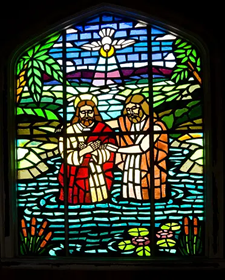 Jesus himself faced many of the same limiting negative comments. When Jesus’ public ministry first began, John first denied the need for Jesus’ baptism by saying John wasn’t worthy to do what Jesus asked him. Jesus was then led to the desert by the devil according to Luke’s account where Jesus authority was questioned and tempted. And, after Jesus first opened the scroll in the synagogue and read from the prophet Isaiah, the people questioned his upbringing and were filled with rage!
Jesus himself faced many of the same limiting negative comments. When Jesus’ public ministry first began, John first denied the need for Jesus’ baptism by saying John wasn’t worthy to do what Jesus asked him. Jesus was then led to the desert by the devil according to Luke’s account where Jesus authority was questioned and tempted. And, after Jesus first opened the scroll in the synagogue and read from the prophet Isaiah, the people questioned his upbringing and were filled with rage!
Often when we have a big idea we too face these questions and temptations. Our supporters may not feel they have the skills to help. We may be tempted with illusions of grandeur such as power, wealth, fame as Jesus’ was in the desert. Or we may face doubt and anger from our closest loved ones. A big idea needs to be nourished by a growth mindset, a positive attitude, and some strong boundaries (and thick skin) to keep the negative at bay.
 When we approach our big idea potential with a growth mindset we are aware of those potential negative opinions and are prepared to deflect with possibility outcomes. When we shift our mindset from defeated to possible, we begin to approach big ideas differently. A new term for this is called liminal thinking. Author Dave Gray defines liminal thinking as a “boundary, doorway, portal…not this or that, not the old way or the new ways, but neither and both.”[1] He says, liminal thinking is “A state of ambiguity or disorientation that precedes a breakthrough to a new kind of thinking. The space between. Liminal thinking is a kind of psychological agility that enables you to success- fully navigate these times of transition. It involves the ability to read your own beliefs and needs; the ability to read others’ beliefs and needs; and the habit of continually evaluating, validating, and changing beliefs in order to better meet needs.”[2]
When we approach our big idea potential with a growth mindset we are aware of those potential negative opinions and are prepared to deflect with possibility outcomes. When we shift our mindset from defeated to possible, we begin to approach big ideas differently. A new term for this is called liminal thinking. Author Dave Gray defines liminal thinking as a “boundary, doorway, portal…not this or that, not the old way or the new ways, but neither and both.”[1] He says, liminal thinking is “A state of ambiguity or disorientation that precedes a breakthrough to a new kind of thinking. The space between. Liminal thinking is a kind of psychological agility that enables you to success- fully navigate these times of transition. It involves the ability to read your own beliefs and needs; the ability to read others’ beliefs and needs; and the habit of continually evaluating, validating, and changing beliefs in order to better meet needs.”[2]
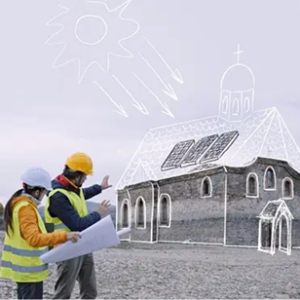 What does liminal thinking and a growth mindset have to do with church? Church is changing. And our church is no exception. If we begin addressing the challenges we face with a defeated before we begin attitude, we’ve already lost – as many other churches are experiencing. Many churches would rather close than change. But, if we approach our challenges with a growth mindset and liminal thinking we can move ahead.
What does liminal thinking and a growth mindset have to do with church? Church is changing. And our church is no exception. If we begin addressing the challenges we face with a defeated before we begin attitude, we’ve already lost – as many other churches are experiencing. Many churches would rather close than change. But, if we approach our challenges with a growth mindset and liminal thinking we can move ahead.
This requires a sense of humility as well because change and growth come with the risk of making mistakes – publicly. We need to be willing to ‘fail forward’. And this requires a willingness to be imperfect and vulnerable.
As we try new things in our church life we face many limiting comments which we’ve all heard and said. The ‘way it’s always been done’ or ‘that’s so and so’s job’ no longer serve us. When one of us is willing to try something new they are trying to Go For It and they are willing to Fail Forward publicly. Whether it’s a new ministry, a new program, or a new structure we’re journeying with liminal thinking into growth and change.
 So the next time one of us has a big idea (like building a garden in the sanctuary) lets couch our comments with the concept of liminal thinking. Changing comments from “Dirt is going to get everywhere…” to “The kids are really experiencing a sense of wonder as their hands are grounded in soil.” Or, “Water’s going to leak all over the pews…” to “Water plays in important role in our spiritual history and our current potential.” Or, “Who’s going to pay for this…” to “What resources can we shift toward the work we find valuable?” Then, we can approach growth and change with a liminal thinking mindset, a child-like sense of wonder, and a Go For It attitude!
So the next time one of us has a big idea (like building a garden in the sanctuary) lets couch our comments with the concept of liminal thinking. Changing comments from “Dirt is going to get everywhere…” to “The kids are really experiencing a sense of wonder as their hands are grounded in soil.” Or, “Water’s going to leak all over the pews…” to “Water plays in important role in our spiritual history and our current potential.” Or, “Who’s going to pay for this…” to “What resources can we shift toward the work we find valuable?” Then, we can approach growth and change with a liminal thinking mindset, a child-like sense of wonder, and a Go For It attitude!
[1] (Gray, 2016)
[2] (Gray, 2016)
References:
Gray, D. (2016). Liminal Thinking, Create the change you want . Rosenfeld Media

Soup for the Soul
by Rev. Dr. Dale Azevedo, Sr. Minister
“Ask someone at the table a question (any question) and then share with them something you admire or appreciate about them.”
These were the words on the bottom back of the card I drew from the pile at our table. Today was our first Lenten Lunch, and what a wonderful lunch it was!
It was wonderful because the food, company, and conversation were each wonderful.
We had seven delightful hungry bellies at our first Lenten Lunch. The meal consisted of homemade potato and leek soup. Don’t tell anyone it was vegan because it was delicious! In fact, the soup was so 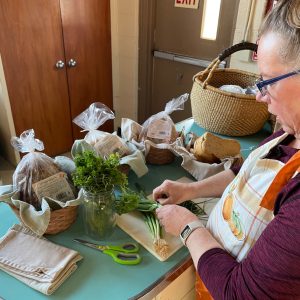 good everyone got up and went for seconds. We also had some nice warm fresh bread to go with our soup. Also don’t tell anyone that I was the first person to dip my bread in the soup. Apparently, it’s impolite! However, when everything is that delicious you can’t help but savor every morsel.
good everyone got up and went for seconds. We also had some nice warm fresh bread to go with our soup. Also don’t tell anyone that I was the first person to dip my bread in the soup. Apparently, it’s impolite! However, when everything is that delicious you can’t help but savor every morsel.
Racquel spent the morning making soup, setting the tables, getting out the “pocket prayer squares,” and setting the tables up all lovely-like. Fellowship hall looked and smelled like a fancy restaurant. We even used real dishes and had sprigs of fresh thyme at each table. When Racquel calls for a Lenten Lunch, she isn’t joking around. When it is my turn in a few weeks, I’ll have a lot to live up to!
Racquel started us off with a traditional Irish prayer. Then we chatted and joked, shared and laughed our way through lunch. When that was over, I grabbed one of the cards from the center of the table and proceeded to follow its instructions (as mentioned above). It was a great way to transition into a slightly deeper level of sharing. Each of us in turn then drew a card and followed the directions it provided, inviting each of us to share a little bit  about our present lives.
about our present lives.
“What is something that you enjoyed recently?”
“What does it mean to be blessed and how have you been blessed recently?”
“What are you looking forward to in the days ahead?”
“What is something that you have experienced lately that was challenging?”
We all took turns reading and sharing and listening. And of course, this sparked us on to further conversation. In the end, I couldn’t have imagined spending my hour and 15 minutes in any better way. It was great to reconnect with church friends, to laugh a little bit in these difficult winter days and enjoy a hearty meal.
15 minutes in any better way. It was great to reconnect with church friends, to laugh a little bit in these difficult winter days and enjoy a hearty meal.
I hope you can make it next week. And if you can’t, maybe you can join us the week after. Racquel and I will be hosting these lunches throughout Lent culminating with our final lunch on Maundy Thursday, March 28. You should really come and join us, we’d love to see you!
You don’t have to, but if you want to RSVP send Racquel an email and let us know you’re coming!
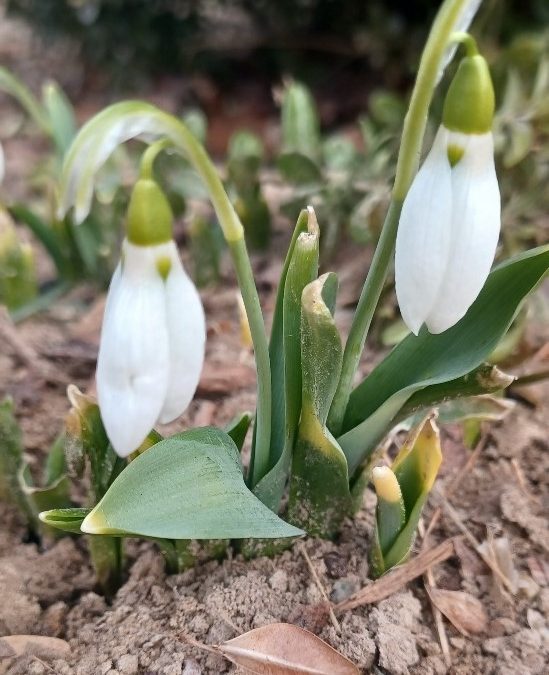
Turning toward the sunshine and the sacred
by Rev. Racquel Ray
Associate Minister of Congregational Life
The Song of the Snowdrop Fairy
by Cicely Mary Barker (1895-1973)
Deep sleeps the Winter, cold, wet and grey:
Surely all the world is dead; Spring is far away.
Wait! The world shall waken: it is not dead, for lo
The Fair Maids of February stand in the snow!
February is here. The month of transitional days begins with the darkness of January and ends with the promise of spring. It was a dreary January. There were too many cloudy days for our solar panels and our psyche to appreciate any solar gain. Seasonal depression was a real challenge for many of us – even those of us for whom this is not usually an issue. I found this Cicely Mary Barker poem comforting and hopeful. Perhaps you do too?
The Song of the Snowdrop Fairy invited me into the garden. It brought me to an observational walkabout around Ray Farm and our church gardens. And, indeed, the Fair Maids of February are standing in the snow (or in this case frozen soil). There are early signs of spring sprouting around the yard and churchyard. For now, we are in a season of hope and preparation.
February is a busy month for my family. We celebrate Lunar New Year with a traditional meal of long noodles, representing a long life. We include orange slices to represent a sweet life and plenty of rice to represent abundant provision. Having served in the military in several Pacific duty stations, our family celebrates with a mix of pan-Asian cuisine. We remember the past and look forward to the coming year.
representing a long life. We include orange slices to represent a sweet life and plenty of rice to represent abundant provision. Having served in the military in several Pacific duty stations, our family celebrates with a mix of pan-Asian cuisine. We remember the past and look forward to the coming year.
We celebrate St. Valentine’s Day and one of our kids’ birthdays. We tap the maple trees in our backyard and spend a week boiling the abundant sap over a wood fire and a specially made stove. Our homemade maple syrup is buttery and smokey; it is rich and dark and very fresh. It is our tradition to celebrate Shrove Tuesday with pancakes smothered in this sweet ichor. Sometimes we’ll 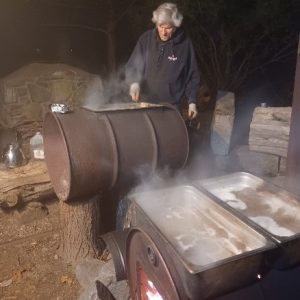 be lucky enough to have johnny cakes or corn meal cakes from last year’s final corn harvest, dried and ground just for this feast. We create a plan for the garden and draw a picture of what will be planted where. And we order the seeds in hopeful expectation of a bountiful autumn harvest.
be lucky enough to have johnny cakes or corn meal cakes from last year’s final corn harvest, dried and ground just for this feast. We create a plan for the garden and draw a picture of what will be planted where. And we order the seeds in hopeful expectation of a bountiful autumn harvest.
In the gardens, the rhubarb is just beginning to break through the mulch. Bright scarlet crowns can be seen among the greys and browns of winter. We’ll soon be harvesting more than we can eat and the overflow will be sliced into bite sized pieces and frozen for later. I usually make a Christmas morning rhubarb crisp many months from now. It often can be enjoyed as pie during coffee hour and potluck meals. The asparagus will be emerging soon and the yard will be dotted with cheery yellow dandelions and deep purple violets. The dandelion roots can be dried and ground and used as a coffee substitute. Our violets are lovingly picked by small hands and made into posies and a delicate light purple spring tonic tea.
Our violets are lovingly picked by small hands and made into posies and a delicate light purple spring tonic tea.
Lent begins on Wednesday, February 14 this year. We as a family and as a congregation will observe the six weeks of preparation before Easter. As the weeks unfold, so will the gardens. Our gardens at home and at church will remind us that new life is imminent.
Pastor Dale and I will be building a garden in the sanctuary throughout Lent. As the weeks pass, our garden will grow and we’ll learn together about the importance of creating sacred spaces; making physical, virtual, temporal, and spiritual places to observe, acknowledge, and celebrate our relationship with God. We’ll learn how to attend 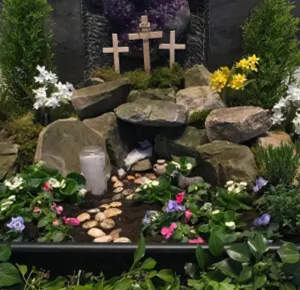 to our prayer lives and nurture our connection with creation and the Creator. We’ll share in Jesus’ praxis of going away to a quiet spot to pray and sometimes it was as simple as ‘a stone’s throw away’ into the garden.
to our prayer lives and nurture our connection with creation and the Creator. We’ll share in Jesus’ praxis of going away to a quiet spot to pray and sometimes it was as simple as ‘a stone’s throw away’ into the garden.
We’ll build a foundational structure and invite the congregation to join us as we add the elements week by week. Soil, representing the nutrient rich foundation where the roots of our faith can take hold and grow deep into the earth. Seeds, representing new ideas co-created and germinated with God to provide for our needs and share with our neighbors. Rocks, representing the cornerstones and building blocks which set boundaries and add structure to our space. Water, representing the power and provision of God which both washes and nourishes us. We’ll add crosses and a tomb to remind us of The Passion and sacrifice of Jesus which makes a way for new life.
As Holy Week and Easter emerge, so will our gardens. The daffodils outside of my church office get an early start in a sheltered corner and are a harbinger of spring to come.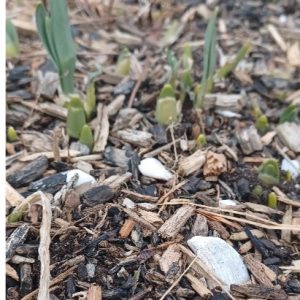 Around the church campus, other clumps of cheerful daffodils, lovingly planted and cared for, will join them in the coming weeks. The pale purple crocus near the labyrinth will blossom. The trees will bud, the forsythia near the kitchen steps will burst with sunny yellow blooms, the pollinator garden will begin to flourish, and our rose hedge will swell with rich greens and coming buds.
Around the church campus, other clumps of cheerful daffodils, lovingly planted and cared for, will join them in the coming weeks. The pale purple crocus near the labyrinth will blossom. The trees will bud, the forsythia near the kitchen steps will burst with sunny yellow blooms, the pollinator garden will begin to flourish, and our rose hedge will swell with rich greens and coming buds.
Where will you find yourself in the coming weeks? Emerging from the dreary grey days of January? Awakening from the frosty hardness of winter? Turning toward the sunshine and the sacred? Looking forward to spring and resurrection? Join us and the snowdrops, the Fair Maids of February, in the journey to new life and new growth in the coming weeks.

A Team for Every Member and Every Member on a Team
by Rev. Dr. Dale Azevedo, Sr. Minister
Last October, we approved our new church structure in principle. This Sunday we will be voting on our new by-laws and (hopefully) moving to our new structure in practice. This will be a fluid transition that we hope will lead to ministries that are more flexible, relevant, and meaningful.
One of the hallmarks of the new structure is its reliance on ministry teams. Although we have called our ministry groups “teams” for a decade now, they have been, for all intents and purposes, “committees”; meaning their membership has been elected and their function prescribed by others. In a true team-based ministry model, teams are comprised of volunteers who coalesce around a common passion for a particular ministry. Teams are far more fluid and dynamic, beginning and ending based upon the passions of membership and the needs of our community.
Of course, in order for this model to succeed it requires passionate people. People need to be committed to a ministry for it to continue. In the old model people might remain on a team out of guilt or a sense of responsibility. In the new model they participate because they really want to! They realize that they get something out of what they are doing and they enjoy being a part of it.
This invariably raises the question, “but what if no one wants to do xxx?” Well, then the answer is that we don’t do that ministry. 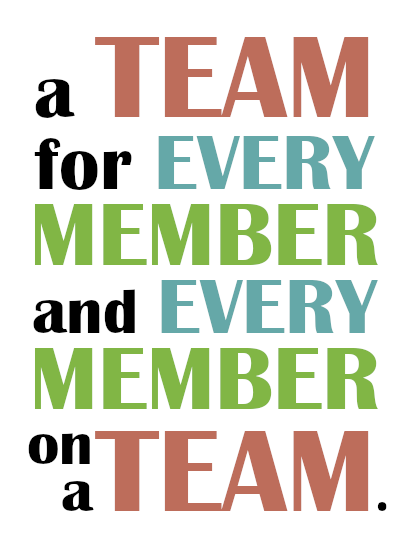 Frankly, if no one wants to participate in a particular ministry, then why are we wasting precious energy trying to make it happen? Now there are some ministries that we simply must do, like taking care of our buildings, managing our assets, and overseeing our personnel. But there are many legacy ministries that just stick around churches either because we have always done that or because someone else thinks it’s important. But if someone thinks is important, then they ought to care enough to help out and make it happen!
Frankly, if no one wants to participate in a particular ministry, then why are we wasting precious energy trying to make it happen? Now there are some ministries that we simply must do, like taking care of our buildings, managing our assets, and overseeing our personnel. But there are many legacy ministries that just stick around churches either because we have always done that or because someone else thinks it’s important. But if someone thinks is important, then they ought to care enough to help out and make it happen!
So the big trick becomes discovering the passions within our membership, identifying the needs of our community, and empowering people to bring these two items together.
This is why I have come up with the slogan: A team for every member and every member on a team.
This is heart of the new structure. In the past teams have been hard to fill because they required people to make a three year commitment, attend monthly meetings, and engage in projects they may not care about. In contrast, most true ministry teams are narrowly focused, meet as they need to, and are inspired by people’s interests.
Here is a chart of all the different teams we expect to start off with categorized according to our mission statement (which is also reflected in the new structure):
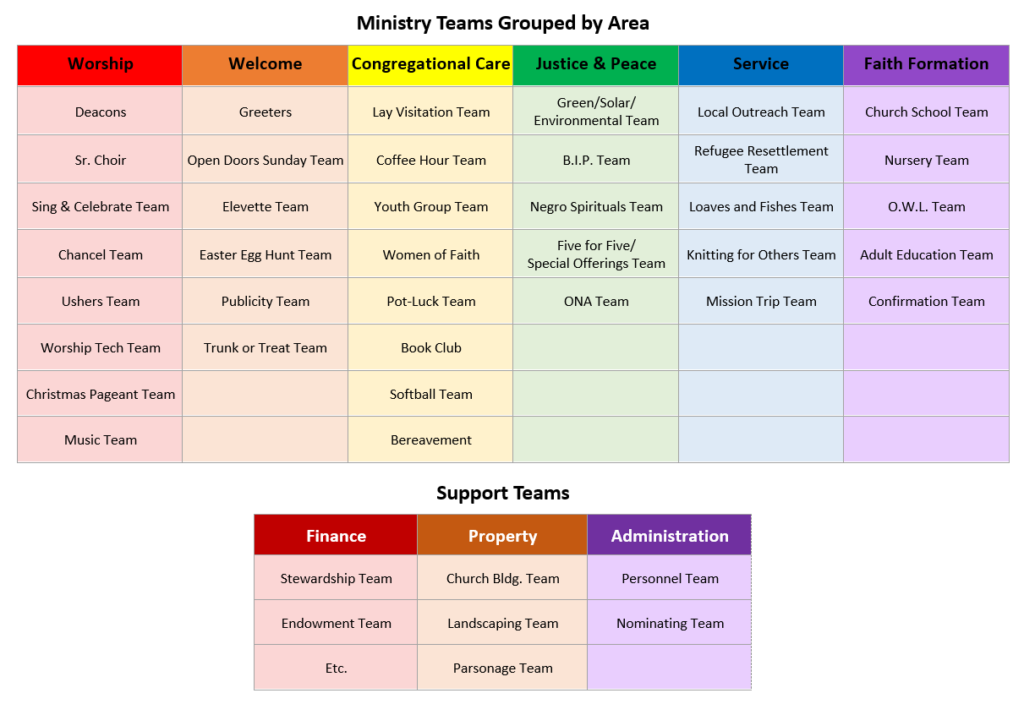
(Click here to enlarge)
And this is just the start! New teams can be formed at any time. We have a process in place that can help anyone in the church start up a new ministry if they feel called.
My hope is that every member of the church will be a part of a team. With so many ministries to choose from and so many of them tailored to particular interests, I hope everyone can find a team that speaks to them, fits within their unique schedule, and makes a difference in the church, community, or world. Wouldn’t that be amazing?!?
 Eventually, hopefully pretty soon, we will have all of these teams listed on the website with information about them and contact information on how to join or help out. That will be a bit of an undertaking to make happen, but it will happen. In the meantime, if you are interested in a team and do not know who to contact you can call the church and someone in the office will be able to point you in the right direction, myself included.
Eventually, hopefully pretty soon, we will have all of these teams listed on the website with information about them and contact information on how to join or help out. That will be a bit of an undertaking to make happen, but it will happen. In the meantime, if you are interested in a team and do not know who to contact you can call the church and someone in the office will be able to point you in the right direction, myself included.
Teams are the heart and soul of the planned new structure. They are the membership of the church. They are where the ministry happens. They are how people get involved and where real change happens. And they cannot exist without you. What would you like to get involved in? How would you like to be a meaningful part of your church? Once you find the answer, let’s talk and we’ll get you involved!
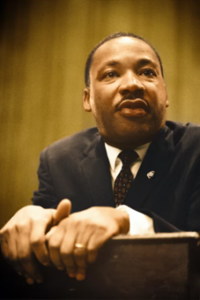
Draw Inspiration from MLK
by Rev. Racquel Ray
Associate Minister of Congregational Life
As we observe the Rev. Dr. Martin Luther King, Jr. holiday over the coming days, may we take a moment to reflect. Most of us know the history and legacy of MLK. What can we glean and carry forward from that knowledge?
Dr. King was a revolutionary and influential leader of the American Civil Rights Movement often quoted and copied. He is “widely regarded as America’s pre-eminent advocate of nonviolence and one of the greatest nonviolent leaders in world history.”[1]
His ministry was prophetic and visionary. He drew from his deeply held faith in the equality of all people and the need for nonviolent resistance. “Dr. King led a nonviolent movement in the late 1950s and ‘60s to achieve legal equality for African-Americans in the United States.”[2] “By using the power of words and acts of nonviolent resistance, such as protests, grassroots organizing, and civil disobedience to achieve seemingly-impossible goals. He went on to lead similar campaigns against poverty and international conflict, always maintaining fidelity to his principles that men and women everywhere, regardless of color or creed, are equal members of the human family.”[3]
However, biblical history will teach us of the cost of prophetic visioning. The work of the prophet is often fraught with violent push-back and persecution. Dr. King was no exception. And perhaps this is why we can admire Dr. King and other visionaries and at the same time be intimidated by this kind of work ourselves.
We often hear the nudges of God. We have dreams and visions. We have hope and inspired ideas and yet we are often afraid to share them. What would we sound like if we stood at the pulpit and shared, “I have a dream….?” Or announced at the dinner table, “Thus saith the Lord…?” What if we followed our declarations with a new idea or innovative ministry or social change?
Somehow, we shy away from the idea. We minimize our imago Dei grandeur. We are created in the image of God, just as MLK was. Why not us?
MLK Day is not only a day of remembrance and observation. It should also serve as a day of inspiration. Beyond his charisma, gifts for oration, and intellectual and spiritual capacity he was a minister of Christ. His call for equality and his dream for justice is informed by the Gospel message of Jesus Christ.
In a cultural climate of dichotomous binary conflicts, dreams and visions, innovation, creativity, and bravery hold answers to a way forward for our community. Inspired by the legacy and life of Rev. Dr. Martin Luther King, Jr. may we dare to dream.
As we await the revelations that this year will bring let us wait with expectation and action. Let us proclaim the dreams and visions we receive. Let us embrace the nonviolent protest and the beloved community. Let us run the race that is set before us with endurance as we chase the ‘long arc of the moral universe that bends toward justice.’[4]
[1] (The Martin Luther King, 2024)
[2] (Rev. Dr. Martin Luther King, 2024)
[3] (The Martin Luther King, 2024)
[4] (The Martin Luther King, 2024) paraphrased
Works Cited
Rev. Dr. Martin Luther King, J. (2024, January). Dr. Martin Luther King Jr., “Remaining Awake Through a Great Revolution.” Speech given at the National Cathedral, March 31, 1968. Retrieved from The King Center: https://www.si.edu/spotlight/mlk?page=4&iframe=true
The Martin Luther King, J. C. (2024, January). About Dr. Martin Luther King, Jr. Retrieved from The King Center: https://thekingcenter.org/about-tkc/martin-luther-king-jr/

What does Christmas mean to you?
by Rev. Dr. Dale Azevedo, Sr. Minister
What does Christmas mean to you?
I thought it would be fun to explore what the “true” meaning of Christmas is. Frankly, because Christmas is such a cultural phenomenon, there are many different, and sometimes conflicting, understandings of what it means. In fact, we each have our own understanding of what it means to us. For some of us, there may be obvious similarities, but I’m sure there are subtle differences based on who we are, how we were raised, and our personal experiences.
So, I went ahead and began to explore how different societal components interpret Christmas. Please keep in mind that this is my interpretation of how these various constituents either present or experience Christmas. They are broad generalizations and may be inaccurate compared with your experience of them. I found this to be a fun exercise and I invite you to join me in it!
 Retailers
Retailers
Christmas is about demonstrating the love you have for others through the giving of gifts.
Hospitality Industry
Christmas is about creating special memories that will last a lifetime and bring you joy now, and also into the future through fond memories.
Family & Friends
Christmas is about spending special time with the important people in your life.
Charitable Organizations
Christmas is about giving generously in ways that make the world a better place.
Entertainment Industry
Christmas is about spreading joy, love, harmony, and goodwill within the larger society.
 Government
Government
Christmas, along with Hanukkah, Kwanza, and any other tradition you wish to celebrate, is about being thankful for all the blessings that a prosperous and peaceful society provides for you and the hope that it will continue for years to come.
Children
Christmas is about presents, school vacation, fun, sweets, presents, and presents.
Parents
Christmas is about providing a happy, joyous, and perhaps meaningful experience for our children as a demonstration of our love for them.
Conversely, Christmas can be about the scarcity of resources and serves as a painful reminder that we cannot provide for our families as we would like.
Those Who Are Grieving
Whether we want it to be or not, Christmas is about those we miss. We may be able to celebrate with our loved ones still with us, but it is tinged with a sense of loss and loneliness and filled with memories of what was.
 Social Media Influencers
Social Media Influencers
Christmas is an opportunity to increase views. Whether focusing on campy traditions, discussing what fashion is best, or stirring up controversy, Christmas is rife with opportunities to sell oneself and one’s content.
The Bible
The Bible doesn’t actually mention or discuss “Christmas”. In fact, the early church was largely opposed to recognizing or celebrating birthdays of any kind. It wasn’t until the 4th century that Christians began the practice that became Christmas, and it wasn’t widely recognized until the 9th! Saying that, the Bible does talk about the importance of Jesus birth. And, as usual, the Bible provides us slightly differing views on the subject. For Matthew, Jesus’ birth is the culmination of God’s saving work, the one who was foretold throughout history, the long-awaited one. For John, Jesus is the cosmic creator, the one who was in the beginning with God, now made flesh, to live among us, and eventually bring about our salvation. So, while “Christmas” may not be a thing in the Bible, Jesus’ birth certainly is. And becomes the event that leads to the celebration of the holy-day.
The Church
Christmas is the celebration of Jesus’ birth. That is it, in its entirety. It is not a celebration of family, friends, love, peace, gifts, generosity, or anything else. Those are all tangential meanings that all find their root in Jesus’ birth. 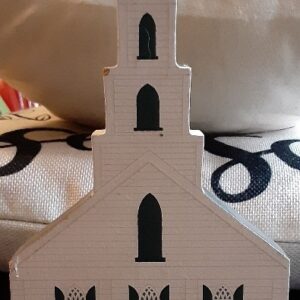 Christmas is about God fulfilling God’s promise to bring about the redemption of creation. It is inescapably tied to Easter. Through the birth, life, death, and resurrection of Jesus, we are saved. At Christmas we celebrate the birth of Jesus as a reminder of Jesus’ ongoing presence with us and his eventual return to finalize God’s redeeming work.
Christmas is about God fulfilling God’s promise to bring about the redemption of creation. It is inescapably tied to Easter. Through the birth, life, death, and resurrection of Jesus, we are saved. At Christmas we celebrate the birth of Jesus as a reminder of Jesus’ ongoing presence with us and his eventual return to finalize God’s redeeming work.
Me
If I am honest with myself, and you, then for me Christmas is about having a break after a very busy season. September through December is one of the busiest and most chaotic times in the life of the church. It can take a lot out of a minister (as it can many others, I’m sure). So, to be able to slow down for a week or more, spend some time with my family, and just regroup is precious. Don’t get me wrong, it’s also about cookies, family traditions, Christmas dinner, and seeing loved ones I don’t often get to see. I’m sure faith is wrapped up in there too, but since that is so intricately connected with work for me (and what much of the previous busy and chaotic months have been about), it can get a little buried. I wonder what my experience of Christmas would be like if I wasn’t serving a church? What would it mean to me? Would it be drastically different? I guess one day I’ll find out.
So, what does Christmas mean to you?
I hope you enjoyed this little experiment. I hope it made you think, reflect, and even chuckle a little. I’d be interested to hear some of your thoughts on all this. Do you think I missed the point on anything or anyone? Is your experience or interpretation different than mine? And what is your personal experience of Christmas? What does it mean to you? If you want, send me an email, and let me know. I’d love to hear it!
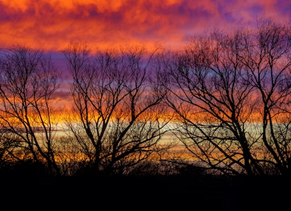
A Light Breaking Forth
by Rev. Racquel Ray
Associate Minister of Congregational Life
I enjoy marking the dwindling daylight of December days. I observe the sunrise and sunset times and the low angles of sunrays that beam through the southern windows. My afternoon walks are hastened by the chill of shortened days. These are the shortest days of sunshine and longest nights of darkness in our region. These are the days of Advent and lights, soup and hot tea, a turnover in the church liturgical calendar year. There is a shift in the sanctuary; the lectionary resets and altar colors change from green to blue. Something is different. Something is coming.
There is a pair of kingfishers, halcyon birds, that come and visit our backyard each December at this time. The spring-fed freshwater pond used to be the local ice-skating spot in years gone by. The kingfishers dart and whistle breaking the golden sparkling stillness of the afternoon. They swoop to the water and back to the trees upsetting the backyard rhythm of blue jays and sparrows. They too are different.
backyard each December at this time. The spring-fed freshwater pond used to be the local ice-skating spot in years gone by. The kingfishers dart and whistle breaking the golden sparkling stillness of the afternoon. They swoop to the water and back to the trees upsetting the backyard rhythm of blue jays and sparrows. They too are different.
There is a legend of the halcyon birds heralding days of calm free from storms and tempests. And in the case of my backyard during Advent, halcyon days are the days around the winter solstice and Christmas. When the kingfishers visit, the days are their shortest, darkest, and the calmest of the year. The first and second candles of the Advent wreath on my dining room table and on our church altar are getting short as well.
 And then there is a shift. In these days, the morning sunrise is minutes later but the afternoons have shifted. One minute at a time, the afternoons are lengthening. The mornings won’t catch up until January. But, there is hope in the extended afternoon. Hope that the sunshine is returning, and a “light is breaking forth” as the prophet Isaiah proclaimed.
And then there is a shift. In these days, the morning sunrise is minutes later but the afternoons have shifted. One minute at a time, the afternoons are lengthening. The mornings won’t catch up until January. But, there is hope in the extended afternoon. Hope that the sunshine is returning, and a “light is breaking forth” as the prophet Isaiah proclaimed.
These same days are wrapped in Christmas preparations. Our packages and Christmas cards are sent to loved ones, friends, colleagues, and congregation members. The Christmas pageant plans are taking shape; script, sheep and shepherds, angels and archangels, manger and magi, Joseph and Mary are ready. We send our end of year gifts and pledges. We volunteer, we share meals, we donate winter coats and mittens. We bring flowers to the cemetery and lay wreaths for remembered veterans. We wait in expectation for the light to break forth in the Nativity as well.
Christmas pageant plans are taking shape; script, sheep and shepherds, angels and archangels, manger and magi, Joseph and Mary are ready. We send our end of year gifts and pledges. We volunteer, we share meals, we donate winter coats and mittens. We bring flowers to the cemetery and lay wreaths for remembered veterans. We wait in expectation for the light to break forth in the Nativity as well.
Isaiah prophesies, “Is this not the fast that I chose: to loose the bonds of injustice, to undo the thongs of the yoke, to let the oppressed go free, and to break every yoke: Is it not to share your bread with the hungry, and bring the homeless poor into your house; when you see the naked, to cover them, and not to hide yourself from your own kin? Then your light shall break forth like the dawn, and your  healing shall spring up quickly, your vindicator shall go before you, the glory of the Lord shall be your rear guard. Then you shall call, and the Lord will answer; you shall cry for help, and he will say, Here I am.”[1]
healing shall spring up quickly, your vindicator shall go before you, the glory of the Lord shall be your rear guard. Then you shall call, and the Lord will answer; you shall cry for help, and he will say, Here I am.”[1]
At Christmastime, we are quick to offer peace to our neighbors, provision to the poor, hats to the homeless, and hospitality to our families. Do we receive the connection between Isaiah’s message and Jesus’ mission to feed, clothe, shelter the least of these among us? The Light that breaks forth in these halcyon days is not merely the sun. The Son, the promised, long-expected Jesus is breaking open the heavens and the virgin womb, connecting creator and creature, lifting creation and cosmos.
connecting creator and creature, lifting creation and cosmos.
And, in the dwindling darkest days that envelop us, can we observe and deeply receive the hope that Light is merely a breath away? An afternoon walk, an inhale and exhale, a candle, a card, a package, a present, a wink and a nod, are all just an awareness awakening to the growing Light in our darkness. And one minute at a time, one person at a time, may we each call upon the Lord and so readily receive Him as we receive the sunshine of lengthening days.
[1] (Coogan, Brettler, Newsom, & Perkins, 2010) Isaiah 58:6-9

The Creative Spark
by Rev. Dr. Dale Azevedo, Sr. Minister
“And God looked at all that God had created, and it was very good.” (Gen 1:31)
There is power in creating. We can feel it when we do it. Maybe it is because we were created in God’s image? Maybe it is because of the Holy Spirit that dwells in us? Or maybe God just made us to be participants in the divine creative process? Either way, we as human beings thrive on creativity.
The Bible begins with an act of creating. The very first words are, “In the beginning, God created…” What did God create? All that we know, all that we see, and all that is. And when God finished, God looked at all that God had created and realized, “Wow, that is really good!”
Have you ever been impressed with something you have created? It could be a piece of woodworking, or a really nice knitting project, or perhaps a home repair. Maybe you have planted a garden or sewn a beautiful garment. Or perhaps you have written a poem or birthed a work of art. Even preparing a delicious meal can be an act of creativity.
There is something that comes over us when we finish a creative endeavor, look back upon it, and realize, “Hey, I did that. And darn it, it’s pretty good!”
I used to do a lot of woodworking. I built tables, hutches, and an armoire. I built all of Seth’s childhood furniture for his room; a matching bed, dresser, and end table. I built oodles of items for church fairs and silent auctions. And there was always such a sense of accomplishment when I finished. Being able to look at something tangible, being able to touch it, hold it, use it, and then realize that “I” made it.
I miss that. I don’t do much wood working anymore. I fix things around the house and repair stuff, but taking a pile of lumber and converting it into something functional and beautiful, that is a whole different feeling. I hope you can all relate with that. I pray you have all had similar experiences in your life, with whatever art, craft, or skill you possess. As I mentioned above, creativity comes through many different skillsets.
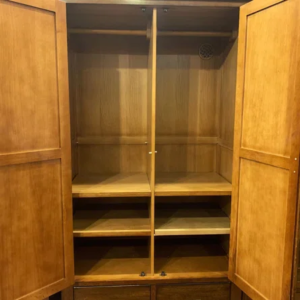 Of course, I should also acknowledge that in every project, and I mean every project I worked on, I experienced at least one moment of paralysis. For me, these moments always came at a point of transition in the project. I accomplished a major step, or completed a challenging task, and I just couldn’t continue. I came to realize that this was fear speaking. I was so proud of the work I had done that I was afraid to carry on. What if during the next step I blow it? What if I make a mistake and the project is ruined? What if I carry on and then don’t like it anymore? I began to expect these feelings and recognize them when they came around. I learned to just take a deep breath, relax, perhaps even take a day or two off. And then, after that, I was often ready, and even eager, to get back to work. You can’t rush creativity. It needs to come at its own pace.
Of course, I should also acknowledge that in every project, and I mean every project I worked on, I experienced at least one moment of paralysis. For me, these moments always came at a point of transition in the project. I accomplished a major step, or completed a challenging task, and I just couldn’t continue. I came to realize that this was fear speaking. I was so proud of the work I had done that I was afraid to carry on. What if during the next step I blow it? What if I make a mistake and the project is ruined? What if I carry on and then don’t like it anymore? I began to expect these feelings and recognize them when they came around. I learned to just take a deep breath, relax, perhaps even take a day or two off. And then, after that, I was often ready, and even eager, to get back to work. You can’t rush creativity. It needs to come at its own pace.
And yes, sometimes I did blow it! Sometimes I did ruin a project or force a major turn in direction. But that just makes the success all the more satisfying when it is achieved.
There was a theological movement that came to prominence in the late 20th century called Process Theology. Process Theology is rooted in the creation story, in the idea that when “the heavens and the earth” were created, God was working with the “formless void” and the “deep.” God interacted with what already existed to create something new. This was a mutual process of creation in which God was not creating out of nothing, but rather working with what was already present. Process theology states that this is how God creates, not universally and individualistically, but in partnership with all of creation, including humankind. This means that we participate with God in the ongoing creative process. We are full and equal participants with God (and all of creation) in the unfolding of the future. This implies that our own creative processes (woodworking, knitting, cooking, sewing, etc.) are likely co-created with God!
the “formless void” and the “deep.” God interacted with what already existed to create something new. This was a mutual process of creation in which God was not creating out of nothing, but rather working with what was already present. Process theology states that this is how God creates, not universally and individualistically, but in partnership with all of creation, including humankind. This means that we participate with God in the ongoing creative process. We are full and equal participants with God (and all of creation) in the unfolding of the future. This implies that our own creative processes (woodworking, knitting, cooking, sewing, etc.) are likely co-created with God!
Can you believe that? Your simple hobby, your artistic endeavors, are part of the divine creation! This leads me to my final thought…question, really:
What are you doing creatively in your life now?
 I mentioned earlier that I used to do a lot of woodworking, but not so much anymore. My tools sit idle and my workbench gathers dust. My time now is often spent doing other things. And, frankly, I enjoy those things. But what have I lost in the process? How often do I have the opportunity to look at something and think, “Wow, I made that. And it’s really Good!” How often do you have that experience? How often do you take the time to make something with your own hands, to co-create with God, and think, “Hey, I did that. And darn it, it’s pretty good!”
I mentioned earlier that I used to do a lot of woodworking, but not so much anymore. My tools sit idle and my workbench gathers dust. My time now is often spent doing other things. And, frankly, I enjoy those things. But what have I lost in the process? How often do I have the opportunity to look at something and think, “Wow, I made that. And it’s really Good!” How often do you have that experience? How often do you take the time to make something with your own hands, to co-create with God, and think, “Hey, I did that. And darn it, it’s pretty good!”
And don’t let fear hold you back. Don’t not do something because you are afraid it won’t come out the way you want. Have faith that God is working with you. And even if it looks silly, even if you won’t ever show it to someone else, know that it is beautiful in God’s eyes. Because God got to create it with you!

Let’s Talk About Money….
by Rev. Racquel Ray
Associate Minister of Congregational Life
Let’s Talk About Money……said NO Pastor ever! Well, that’s not entirely true, is it? We can honestly say that for most of us talking about money is uncomfortable. Especially in a church context, talking about money has become a rather taboo topic.
Sure, we hear about money during the annual church stewardship season. Each church has a different approach for fundraising through an annual campaign of some sort. There are stark differences in how each denomination handles ‘giving’. And the spectrum runs from obligatory tithing to be ‘of good standing’ to mandated percentages to receive salvation, to generosity campaigns. The theological arguments around money precede even Judas’ betrayal of Jesus for 30 silver coins. When we turn to biblical answers for responsible stewardship, we often read of sharing resources as a community and tithing a ten percent offering. A pastor once shared, “You can live better on 90% of your income with God’s blessing than you can on 100% without God’s blessing!”
 Proverbs 22 begins with, “The rich and the poor have this in common: the Lord is the maker of them all” and includes, “Those who are generous are blessed, for they share their bread with the poor.” Biblical answers often revolve around rich and poor dichotomies. If the rich give their money to the poor all shall be well. The problem is that many of us feel poor and don’t feel we have much to give. So, what does it mean to be generous and to live generously? How can we shift our mindset, our lifestyles, and our ministry from poverty toward prosperity?
Proverbs 22 begins with, “The rich and the poor have this in common: the Lord is the maker of them all” and includes, “Those who are generous are blessed, for they share their bread with the poor.” Biblical answers often revolve around rich and poor dichotomies. If the rich give their money to the poor all shall be well. The problem is that many of us feel poor and don’t feel we have much to give. So, what does it mean to be generous and to live generously? How can we shift our mindset, our lifestyles, and our ministry from poverty toward prosperity?
We often hear statements about church and money connected to the concept of church closure. There is also a repercussive reaction to save the church through fundraising. We hear comments like, “We need more money.” Pastors are often in the ‘hot seat’ to answer questions around fundraising. How will you raise money? How will you build the endowment? How will you reduce the budget, cut expenses, reduce spending, and shrink benefits and salaries for employees? And, because pastors are called to preach the gospel, feed the hungry, clothe the naked, welcome the stranger, heal the sick, house the unsheltered, and love their people we’re not often fiscally driven. This usually results in churches turning to financial experts within the congregation who are great with numbers and hopefully are able to navigate the non-profit nature of church ministry and mission as well. Often there is a gap between mission and money which results in church ‘bankruptcy’ and closure and a ‘poverty’ mindset.
 I am bereaved every time I hear, “The church is dying.” This statement is spoken often in the many places I visit: Yale Divinity School and seminarian campuses, denominational gatherings, social media outlets, and national news media. The Church is dying? How do you feel about that statement? I disagree with it and would offer this, “The Church is changing.” And many churches would rather close (or die) than change.
I am bereaved every time I hear, “The church is dying.” This statement is spoken often in the many places I visit: Yale Divinity School and seminarian campuses, denominational gatherings, social media outlets, and national news media. The Church is dying? How do you feel about that statement? I disagree with it and would offer this, “The Church is changing.” And many churches would rather close (or die) than change.
 The difference we need is philanthropy. It is a shift from transactional stewardship giving to a future oriented relational and emotional giving. We often give to church, a prescribed amount, pledged annually in response to the gratitude and joy we find in our church communities, in order to keep the programs and services going. When we shift to a philanthropic mindset toward giving, we are investing in the potential mission of the recipient. We may give to NPR because we believe in the value of unbiased reporting. We may give to our alma mater because we want to see young people have the same opportunities to flourish as we enjoy, we may give to the arts because we believe in the value of cultural creativity.
The difference we need is philanthropy. It is a shift from transactional stewardship giving to a future oriented relational and emotional giving. We often give to church, a prescribed amount, pledged annually in response to the gratitude and joy we find in our church communities, in order to keep the programs and services going. When we shift to a philanthropic mindset toward giving, we are investing in the potential mission of the recipient. We may give to NPR because we believe in the value of unbiased reporting. We may give to our alma mater because we want to see young people have the same opportunities to flourish as we enjoy, we may give to the arts because we believe in the value of cultural creativity.
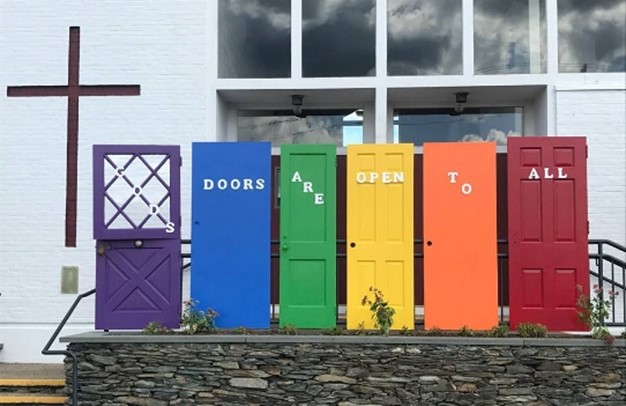 What does philanthropy look like in a church context? It’s multi-faceted; individual giving to the church, the church giving to the individual, and the collective congregation giving to the larger community – locally, regionally, nationally, and globally.
What does philanthropy look like in a church context? It’s multi-faceted; individual giving to the church, the church giving to the individual, and the collective congregation giving to the larger community – locally, regionally, nationally, and globally.
We are privileged to be connected with a church that is very visibly intentional about our welcome. “God’s Doors are Open to All” speaks to our outwardly facing advocacy and mission toward inclusion of ALL PEOPLE.
Our members are immersed in some of the most life-changing, community-affirming, and love-abiding institutions, organizations, and businesses in the region. We are clergy members sitting alongside people in their most challenging life events in our work as chaplains. We are presidents and CEOs of non-profit organizations working daily in marginalized communities providing basic needs and resources to make a difference in the lives of our neighbors in need. We are artists, musicians, students, and activists. We are parents and grandparents finding welcome and support for our young people. We are a safe space for children and youth to gather and grow in their faith. We are forward thinking, green and g rowing, community oriented, and partnership seeking. We are a beacon of happiness and a reflection of healthiness. We take a stand and make a statement. We are a church that is growing, future-minded, and that stands as a visible example for others.
rowing, community oriented, and partnership seeking. We are a beacon of happiness and a reflection of healthiness. We take a stand and make a statement. We are a church that is growing, future-minded, and that stands as a visible example for others.
This church is NOT dying. This church is changing. We have an opportunity to not only grow into the future of the church but to be the future of the church and to stand as an example for others of how to do that successfully.
 THAT is something I want to support. I want to support a church that is heading toward a bright future. What does the church of the future look like? It is welcoming to ALL people. It is fluid and flexible. It takes a stand and stands with others. It speaks the truth. It cares for its members and friends. It welcomes the stranger, feeds the hungry, shelters the unsheltered, heals the sick, and clothes the naked.
THAT is something I want to support. I want to support a church that is heading toward a bright future. What does the church of the future look like? It is welcoming to ALL people. It is fluid and flexible. It takes a stand and stands with others. It speaks the truth. It cares for its members and friends. It welcomes the stranger, feeds the hungry, shelters the unsheltered, heals the sick, and clothes the naked.
When I support the church, I’m not doing so to keep the lights and heat on and the bills paid. I am investing in the people that make a visible difference in our community. I’m investing in a future where this church is a beacon of justice, inclusivity, action, and education. I’m investing in a living history that is both rooted and branching. I stand with this church and support this church as a beacon of hope for the future.

Understanding Transgender Identity: embracing all God’s children
by Rev. Dr. Dale Azevedo, Sr. Minister
You have an opportunity on November 5th.
On that Sunday, the Open and Affirming (ONA) Team has invited Quinten Foster to come and speak with our congregation after worship. Quinten is the Director of Transgender Whole Healthcare at East Bay Community Action Program (EBCAP) and he has agreed to talk with us on understanding transgender identity.
As you may be aware, issues surrounding transgender rights and transgender care have become a major thrust in the so-called “culture wars” we are facing in this country. And these justice issues will undoubtedly play a significant role next year as we move into our next election cycle. For this reason, the ONA Team felt it was important to make understanding transgender identity a priority for our church as we continue to live into our Open and Affirming Status.
So what does it mean for a person to be transgender?
Transgender is a broad term that can be used to describe people whose gender identity is different from the gender they were thought to be when they were born. “Trans” is often used as shorthand for transgender…Some transgender people identify as neither a man nor a woman, or as a combination of male and female, and may use terms like nonbinary[, gender fluid,] or genderqueer to describe their gender identity. Those who are nonbinary often prefer to be referred to as “they” and “them.” 1
This experience is known as gender dysphoria in the medical profession.
While it may seem to many in our society that this is a modern phenomenon, it really isn’t. Transgender folks have been around for as long as human beings have been around. There have always been those who felt confined by, or misplaced within, the gender identity they were raised with. We just haven’t always had a word for it. The first publicly open transgender “celebrity” in the United States is widely accepted as Christine Jorgensen, who appeared on the cover of the December 1, 1952 edition of the New York Daily News. The headline read, “Ex-GI Becomes Blonde Beauty,” following her return from gender affirming surgery in Denmark. She went on to become an actor, entertainer, and advocate. 2
this is a modern phenomenon, it really isn’t. Transgender folks have been around for as long as human beings have been around. There have always been those who felt confined by, or misplaced within, the gender identity they were raised with. We just haven’t always had a word for it. The first publicly open transgender “celebrity” in the United States is widely accepted as Christine Jorgensen, who appeared on the cover of the December 1, 1952 edition of the New York Daily News. The headline read, “Ex-GI Becomes Blonde Beauty,” following her return from gender affirming surgery in Denmark. She went on to become an actor, entertainer, and advocate. 2
It has been a long, slow, and VERY bumpy road for those who identify as transgender for the 70 years since that article was published. And while discrimination and threats have always been a part of the transgender reality in the US, it has only been more recently that widespread efforts to curtail the rights of trans youth and adults and been successful. So far this year there have been 547 bills introduced in 49 states that seek to restrict sports activities, bathroom access, medical care, and other basic human rights for those with gender dysphoria. Of those, 83 have passed, 125 have failed, and 366 are still active. 3 That is a lot of bills seeking to restrict one small (but equally valuable) portion of our population.
And yet, with all the publicity, legal wrangling, and media hype around transgender issues, there is still an amazing amount of confusion and misunderstanding surrounding persons who identify as transgender. I have heard many  of these questions myself:
of these questions myself:
- How is it possible to for someone to be a man yet feel like a woman?
- What does it even mean?
- Why would someone choose to do this to themselves when life could be so much easier?
- Why can’t these people just accept who they are?
- It’s pretty obvious God made us man and woman. Who are they to think they can change that?
- I don’t even understand why someone would want to be different than God made them?
As I stated above, the ONA Team felt it was important to make understanding transgender identity a priority for our church if we are to truly live into our Open and Affirming identity. Our goal for the workshop on Nov. 5 is to provide a safe and healthy place where honest and compassionate dialogue can take place. Quinten, as our presenter, will share a lot of information with us to help deepen our knowledge and understanding of this minority community and their personal experiences. We will also encourage those present to ask relevant questions, inviting us to lean into some of the confusion or lack of clarity any of us may have on the issue. Again, we will be working closely to make sure this is a safe space for  compassionate exchanges of ideas, knowledge, and experiences.
compassionate exchanges of ideas, knowledge, and experiences.
So, you have an opportunity on November 5th to learn, grow, experience, and flex your faith muscles as we explore this increasingly relevant topic. I hope you will take advantage and attend this workshop.
On a side note, as I was preparing to write this blog, I came across an interesting book. It is entitled, Understanding Transgender Identities: Four Views. What struck me about this book is that seeks to explore the issue of transgender identity from a variety of differing Christian perspectives. These perspectives range from what I would term traditional/conservative views to more affirming/inclusive stances. I have not read the entire book yet, but from what I have absorbed the authors and editors do a remarkable job providing a well written book that is respectful toward the diverse theological views it shares and the people it discusses. You may want to consider picking it up if you wish to explore the issue from a variety of Christian perspectives.
Hope to see you at our workshop,
Dale
1 https://transequality.org/issues/resources/understanding-transgender-people-the-basics
2 Understanding Transgender Identities: Four Views, ed. by James K. Beilby, Paul Rhodes Eddy, Baker Academic Press, 2019.
3 https://www.translegislation.com/


